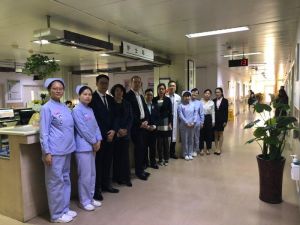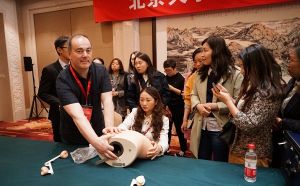EAUN celebrates 10th anniversary of
co-operation with Asia

Multi-professional approaches to urological care are fundamental in ensuring positive outcomes in urological care, in which nurses are central and play a pivotal part. Furthering this approach, our visit to China celebrated the 10th anniversary of the collaboration between the Chinese (CUAN), Hong Kong (UNAHK) and European urology nursing communities. It symbolises a decade of continued friendship and strong educational links in the development of urological nursing both now and for the future.
Practical workshops and lectures

EAUN SIG Chair Lawrence Drudge-Coates and Ms. Lani (Head of Urological Nursing) at The First Affiliated Hospital, Sun Yat Sen University Hospital, Guangzhou (CH)
The collaborative educational programme delivered both practical workshops and lectures covering clinical aspects in prostate cancer in conjunction with our physician colleagues. Broader aspects of care approaches including that of evidence based guideline development and concepts regarding specialist nursing were discussed and delivered in English, Cantonese and Mandarin Chinese.
Unfortunately, illness prevented Paula Allchorne (EAUN Chair Elect) from attending the meetings with myself. I am delighted to say, however, she is now well and back on her feet. So on behalf of the EAUN I set upon delivering over 20 lectures and educational workshops over 10 days, across China from Guangzhou in the south, to Hefei, Tianjin and Beijing in the north. As always, a somewhat intensive schedule which required a degree of sleep deprivation, caffeine and amnesia regarding the task ahead, but thoroughly rewarding.

Urology Ward visit – The 2nd Affiliated Hospital, Tianjin
These visits also afforded us the chance to see urological nursing first-hand and there was great interest in our visits to the wards from both patients and staff alike. In addition, many high-level healthcare and hospital leaders were present at the meetings in support of these conferences for nurses.
Essential podcasts
The EAUN lectures in China (Guangzhou, Hefei, Beijing, Tianjin) were attended by over 1,000 delegates. Thanks to supporting technology, nurses were able to follow both the lectures and workshops online by accessing podcasts. This is an essential element in China when considering education approaches due to the sheer size of the country and the ability of nurses to travel to these meetings. In my opening speeches, on behalf of the EAUN, I once again reiterated the importance of such collaboration and from its infancy recounted the developments and significant achievements that had already occurred. I stressed that “while being divided by culture and language, there was a strong unity in the need to provide optimal patient care for urology patients, and as such collaboration provided the vehicle by which to achieve this goal” and that we had a lot to learn from each other.

Peking University Hospital, Urology Department – workshop on rectal examination
Nurse specialisation
This year also saw a growing interest in the concept of nurse specialisation in urology with the development of programmes in urological nursing as the first nursing discipline in China to address this issue and begin to formulate key aspects of this approach. Experiences from the UK and elsewhere were viewed with great interest, and allowed all parties to consider both the positive and negative aspects, while identifying commonalities in the rationale for these approaches to be developed.
Once again this visit proved to be a highly interactive educational event, with a real sense of the mutual need to develop urology nursing excellence and therefore all credit goes to our colleagues from Hong Kong & China. Without their continued support such an event would not be possible.
Lawrence Drudge-Coates, Urological Oncology CNS, Chair, EAUN Special Interest Group Prostate Cancer, London (UK), ldrudge-coates@nhs.net

